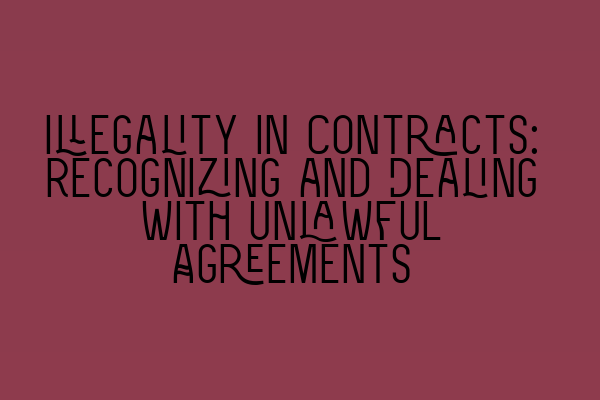Illegality in Contracts: Recognizing and Dealing with Unlawful Agreements
In contract law, the basic principle is that contracts are legally binding agreements between parties. However, not all agreements are enforceable under the law. There are instances where the subject matter or the performance of a contract may be illegal or against public policy. Such contracts are considered unlawful, and it is essential to recognize and deal with them appropriately to protect your rights and avoid legal complications.
Understanding Illegality in Contracts
Illegality in contracts refers to agreements that involve illegal activities or are contrary to public policy. The law prohibits the enforcement of such contracts because they involve illegal acts, promote harm, undermine public interests, or violate social norms. Examples of illegal contracts include those related to fraud, smuggling, drug trafficking, or any agreements that infringe upon human rights.
It is crucial to note that illegality can either be direct or indirect. Direct illegality occurs when the contract itself is prohibited by law or involves illegal activities. Indirect illegality arises when the performance of the contract involves illegal acts, even if the contract itself is legal.
Recognizing Unlawful Agreements
Identifying unlawful agreements can be challenging, as they do not always reveal themselves explicitly. Here are some indicators that can help you recognize potentially unlawful contracts:
- Contrary to Statute Law: If a contract violates any statute or law, it is likely to be unlawful. For example, a contract that promotes discrimination or engages in deceptive practices is contrary to statute law.
- Violates Public Policy: Contracts that undermine public safety, health, or welfare are deemed unlawful. This includes agreements that encourage illegal activities or aim to defraud the government or the public.
- Unconscionable Terms: Contracts that contain extremely unfair or oppressive terms are considered unlawful. It is important to ensure that both parties have equal bargaining power and that the terms are not unconscionable.
- Illegal Subject Matter: Agreements that involve illegal activities, such as selling illegal substances or hiring unlicensed individuals, are unlawful.
- Violation of Public Interest: Contracts that seek to undermine the public interest, such as agreements that restrict competition or violate environmental regulations, are likely to be unlawful.
Dealing with Unlawful Agreements
When you discover that a contract is unlawful, it is crucial to take appropriate actions to protect your rights and avoid legal consequences. Here are some steps you can take:
- Seek Legal Advice: Consult with a legal professional who specializes in contract law to understand the implications and options available to you.
- Terminate the Contract: If the contract is deemed unlawful, you have the right to terminate it immediately. Be sure to follow the termination procedures outlined in the contract or seek legal guidance to ensure you handle it correctly.
- Address Any Damages: If you have suffered any damages or losses due to the unlawful agreement, consult with your lawyer to explore potential remedies, such as seeking compensation.
- Report Illegal Activities: If the contract involves illegal activities, it may be crucial to report them to the relevant authorities. Your lawyer can guide you on the best course of action.
Remember, dealing with unlawful agreements requires proper legal guidance to ensure your rights are protected and to minimize any potential negative consequences.
For more information on contract law and related topics, you can find additional resources here:
- SQE 1 Practice Exam Questions
- SQE 1 Practice Mocks FLK1 FLK2
- SQE 2 Preparation Courses
- SQE 1 Preparation Courses
- SRA SQE Exam Dates
By staying informed and seeking professional guidance, you can navigate the complexities of contract law and protect your rights.
